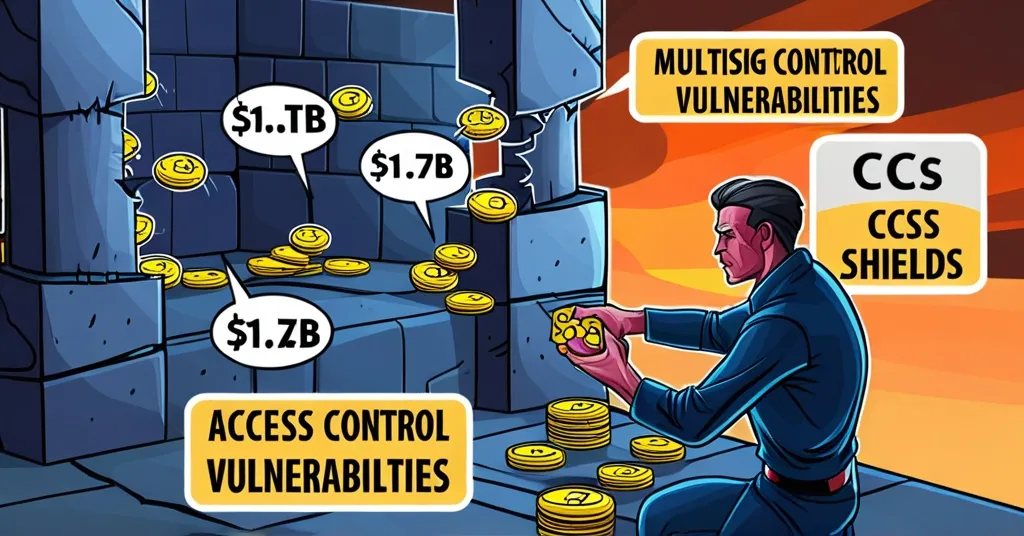Crypto Hacks Skyrocket to $1.7B in 2024 Due to Access Control Flaws

Access Control Vulnerabilities Surge, Causing $1.7B in Crypto Hack Losses
In 2024, the crypto world faced a staggering $1.7 billion in losses due to access control vulnerabilities, affecting centralized exchanges, decentralized platforms, and the gaming/metaverse sectors. This highlights the urgent need for robust security measures across the board.
- $1.7B lost due to access control vulnerabilities in CeFi, DeFi, and gaming/metaverse.
- DeFi losses down 40%, gaming/metaverse struggles.
- Hacken suggests multisig management and CCSS for enhanced security.
Overview of 2024 Losses
The cybersecurity firm Hacken’s 2024 Web3 Security Report reveals a sharp rise in crypto hack losses, reaching $1.7 billion from less than $1 billion the previous year. Access control vulnerabilities were the primary cause, accounting for 75% of the damages across various sectors. These vulnerabilities stem from unauthorized access and private key theft, becoming a focal point for attackers as the industry grows and matures.
While the crypto landscape is ripe with potential, it’s also a battlefield where hackers are constantly probing for weaknesses. No bullshit—crypto security needs to be taken seriously. The report paints a grim picture, but it’s not all doom and gloom. The industry is learning, and some sectors are stepping up their game.
Sector-Specific Insights
In centralized finance (CeFi), major incidents at DMM Exchange and WazirX led to over $500 million in losses. DMM Exchange was hit with a $305 million hack, while WazirX suffered a $234.9 million breach. These incidents underscore the vulnerability even in supposedly secure centralized systems.
Conversely, the decentralized finance (DeFi) sector saw a significant reduction in losses, dropping from $338 million in 2023 to $114 million in 2024, thanks to enhanced security protocols. Tools like Multi-Party Computation (MPC) and Zero-Knowledge (ZK) cryptography have been instrumental in securing cross-chain bridges, which are often targeted by hackers. MPC allows multiple parties to jointly compute a function over their inputs while keeping those inputs private, and ZK cryptography enables one party to prove to another that a given statement is true without revealing any information beyond the validity of the statement itself.
Yet, while DeFi shows resilience, it’s not without its critics. Some argue that the focus on DeFi security has come at the expense of other sectors, a point worth considering as we champion the broader blockchain revolution.
Challenges in Gaming and Metaverse
The gaming and metaverse sectors have struggled with securing access management, with platforms like PlayDapp losing $290 million. These newer platforms are often targeted by sophisticated attacks, highlighting the challenges of securing emerging technologies. The sector recorded $389 million in losses, with major incidents accounting for $358 million of that total.
Securing your crypto is no game, unless you’re in the gaming/metaverse sector, where it literally is! But with great innovation comes great responsibility, and these sectors need to catch up fast.
Security Recommendations
To combat these vulnerabilities, Hacken recommends implementing advanced multisig management, deploying automated incident response systems, and adhering to the Cryptocurrency Security Standard (CCSS). Multisig management requires multiple signatures to authorize transactions, adding an extra layer of security. Automated incident response systems can help mitigate damage by quickly responding to breaches. The CCSS is a set of security standards tailored for the crypto industry, covering key areas such as key and seed generation, wallet creation, key storage, key usage, and key compromise protocols.
“Access control vulnerabilities have emerged as the leading cause of crypto hack losses in 2024, accounting for a whopping 75% of total damages across decentralized finance (DeFi), centralized finance (CeFi), and gaming/metaverse sectors, excluding phishing attacks.”
“To safeguard against these threats, Hacken outlined that businesses must implement advanced multisig management, automated incident response, and adhere to the Cryptocurrency Security Standard (CCSS) to ensure stronger private key security and reduce operational vulnerabilities across Web3.”
The Broader Security Landscape
North Korean hackers have reportedly increased their activities by 102.88% in 2024, stealing $1.34 billion across 47 incidents. This shift in focus from DeFi to centralized services underscores the evolving nature of these threats. The increased sophistication and frequency of North Korean hacking activities add a geopolitical dimension to the security challenges faced by the crypto industry.
As we navigate the wild west of cryptocurrency, the battle against cyber threats remains relentless. But amidst these challenges, there’s a silver lining. The proactive steps taken by the DeFi sector and the push for standardized security practices like the CCSS represent a beacon of hope. As we champion decentralization, freedom, privacy, and the disruptive potential of blockchain technology, it’s crucial to remain vigilant and innovative in our approach to security.
Key Questions and Takeaways
- What is the primary cause of crypto hack losses in 2024?
Access control vulnerabilities, accounting for 75% of total damages.
- How have losses from access control issues changed from 2023 to 2024?
Losses increased from less than $1 billion to $1.7 billion.
- Which sectors were most affected by access control vulnerabilities?
Centralized finance (CeFi), decentralized finance (DeFi), and gaming/metaverse sectors.
- What measures are recommended to mitigate these vulnerabilities?
Advanced multisig management, automated incident response, and adherence to the CCSS.
- How has the DeFi sector managed to reduce its losses?
Through improved security measures, particularly for cross-chain bridges, resulting in a 40% reduction.
- What are the specific tools mentioned that have helped secure DeFi?
Multi-Party Computation (MPC) and Zero-Knowledge (ZK) cryptography.
- Why are gaming and metaverse sectors still struggling with security?
Challenges in securing access management on newer platforms, with major incidents accounting for significant losses.
As we push forward in this revolutionary space, let’s remember what we’re fighting for: a decentralized future where freedom, privacy, and innovation reign supreme. The journey is fraught with challenges, but hey, who said disrupting the status quo was going to be easy? Let’s keep pushing forward, one secure block at a time.



